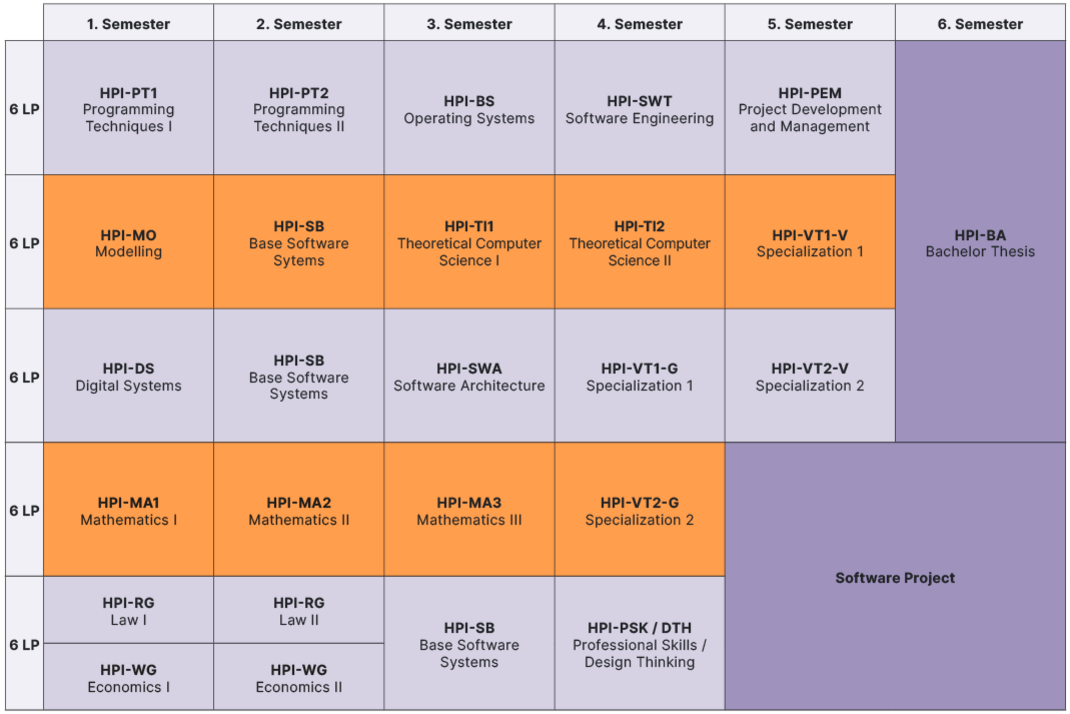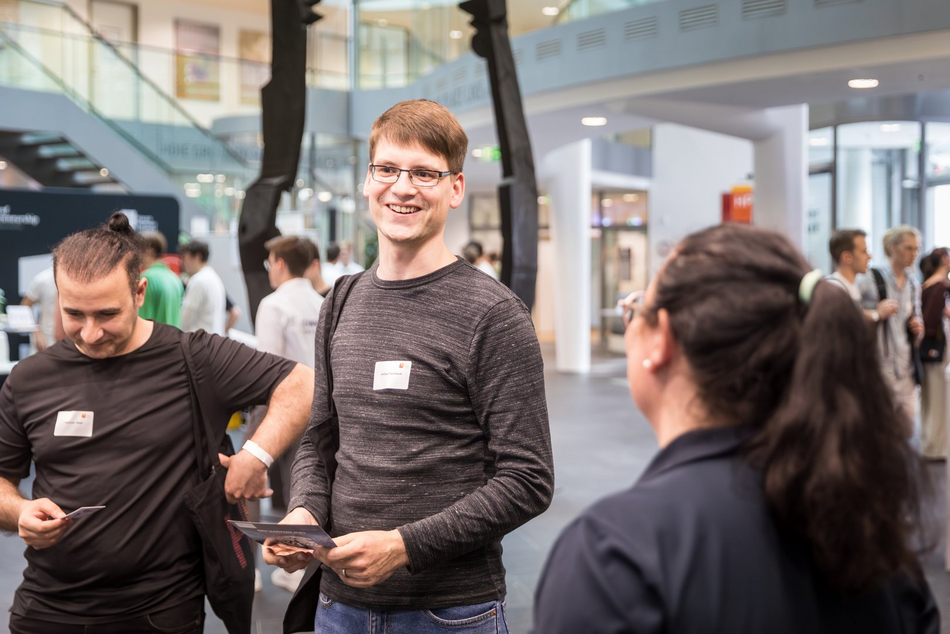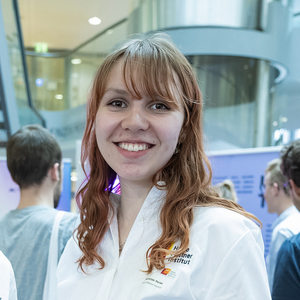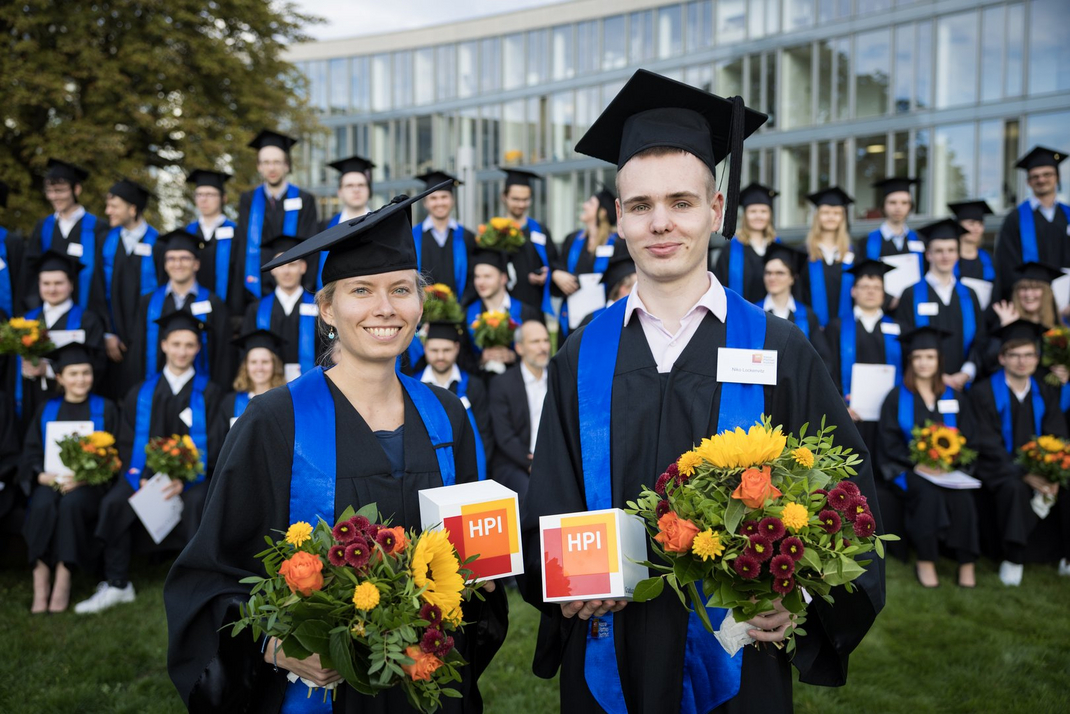Begin your Computer Science journey at HPI
With the Bachelor's program in IT-Systems Engineering at HPI, you learn more than just programming. You understand the significance of technologies for our world and work on solutions for a sustainable and innovative future.
Develop technological solutions that advance society. We equip you with the latest computer science knowledge and an engineering mindset to boldly tackle the challenges of tomorrow.
Your Benefits at HPI
- Work with like-minded individuals in small teams with intensive supervision
- Take your studies abroad for a research project or internship
- Excellent job prospects where you can make a difference
- Collaboration with business and industry
- Work on current issues and challenges of digitalization
Going abroad: Do you want to gain international perspectives during your studies? You can gather a semester of international experience at one of our European partner universities. Additionally, there is the opportunity to complete internships abroad (e.g., in the USA in Silicon Valley).
HPI supports you with your application and maintains strategic partnerships with international IT companies for internships.
Facts about the program
- Application deadline: July 15*
- Start of studies: Winter semester
- No tuition fees**
- Credits: 180
- Language: German
- Instruction: In German (DSH2)
- Standard study period: 6 semesters
* (Application period from June 1 to July 15); ** only University of Potsdam semester fees
Learn from the best
The latest CHE University Ranking 2024/25 reaffirms Hasso Plattner Institute's top position in computer science in Germany, with its Bachelor's program in IT Systems Engineering receiving top ratings across all surveyed categories.

Study Contents: IT Systems Engineering (B.Sc.)
Computer science is more than just programming: with us, you will learn to understand, plan, develop, evaluate, and maintain complex and interconnected IT systems. You will find creative solutions to complex technical problems and tackle the big questions of our time.
- Fundamentals of IT Systems Engineering
- Software Engineering and Modeling
- Mathematical and Theoretical Foundations
- Software-Based Systems*
*(Operating Systems, Computer Graphics Systems, Database Systems, Interactive Systems, Process-Oriented Information Systems, Web and Internet Technologies)
In the Bachelor's program in IT Systems Engineering, you can focus on different areas of specialization in the following fields:
- Business Process & Enterprise Technologies
- Human Computer Interaction & Computer Graphics Technology
- Internet, Security & Algorithm Engineering
- Operating Systems & Information Systems Technology
- Software Architecture & Modeling Technology
- Economic Fundamentals
- Legal Fundamentals
- Design Thinking
- Professional Skills
Course catalog
Sample study plan: IT Systems Engineering (B.Sc.)

Skills for your Career

Bachelor Project
The centerpiece of the study program is the Bachelor Project: In the fifth and sixth semesters, you will develop your own software project together with like-minded individuals. This includes concrete tasks from partners in business, society, and research. With the Bachelor Project, you apply what you have learned in practice.

Professional Skills
In a time when technology constantly pushes the boundaries of what is possible, skills such as critical thinking, intercultural communication, teamwork, project management, and ethical decision-making are essential. This is why we place great emphasis on Professional Skills.

Entrepreneurship
Do you want to actively shape the future with your own company or technology start-up? Our course offerings open the door to successful self-employment.

Design Thinking
From foundational concepts to hands-on projects, unlock your innovation potential with the techniques and mindset of Design Thinking.
Career Prospects
Heroes Who Make a Difference: In a world increasingly shaped by digital innovations, IT experts are indispensable. With a Bachelor of Science in IT Systems Engineering, you are ready to shape the digital future yourself. You influence a better world by developing sustainable solutions for global challenges – from combating climate change to improving public health to ensuring data security and privacy.
You will implement your future topics in global corporations, medium-sized companies, or start-ups. As software architects, software developers, or project managers, you will find exciting career opportunities in fields such as AI-driven data analysis, autonomous systems, machine learning, or AI development.

HPI is a place where I can take my technical skills to the next level.
Mathilda Heise, HPI student
Application
If you enjoy mathematics, teamwork, intellectual challenges, and have a good understanding of both German and English, then you will have fun developing IT solutions for business and society with us. All information about the application process can be found on the application page for the bachelor's program.
Contact


Johanna Schulz
Teamlead Admissions and Program Management
Phone: +49-(0)331 5509-4808
Mail: studinfo@hpi.de
Related Links
Bachelor's graduation ceremony
Last change: 23/09/2024, Geronimo Förster








